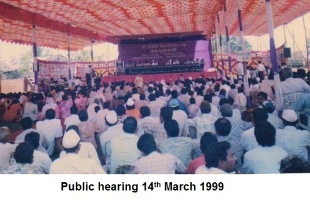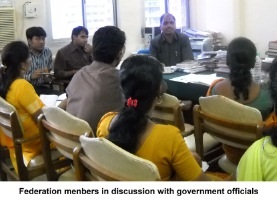Working towards inclusive and sustainable socio-economic
development...
Themes
Techno-Economic Rural Development
Strengthening Citizen Leadership
Disaster Risk Reduction & Mitigation
Responce to Climate Change Issues
Advocacy >>
Themes > Advocacy >
Advocacy >>

Parivartan has undertaken issue based advocacy efforts at block, district and state level. Initiating positive actions to resolve the issues is a primary agenda for Parivartan. Instead of advocating the issue on behalf of people, we believe that it should become a part of People Organizations' (POs') plan of action. Parivartan has played a catalyst role in stimulating mass support, experts' advice and alliance building for the PO's efforts on issue based activities. Parivartan has built the capacity of PO leaders to lead the process of advocacy in a democratic manner. Advocacy tools like Multi-stakeholders' Dialogue, Public Hearing, collection of facts and evidences, hard-hitting follow-up with bureaucrats have been instrumental in getting positive results on issues.
Our experience in advocacy
Initial years of Parivartan were completely devoted to the Interventions for 'Environmentally Sustainable Industrial Development'. Parivartan effectively facilitated issues aroused due to industrialization in Lote Industrial Area & Lote Industrial Extension Area. Pollution control, land acquisition, migration, tenancy & other land issues were to name a few. This complete process could be successfully driven only because of the force exerted by the local People's Organizations. Building public awareness on their rights & responsibilities, representing the issue on local, district & state level, and liasoning with media-academia, experts, industrialists, bureaucracy & social sector etc. fronts were efficiently handled by Parivartan.
Jansunavani (Public hearing, 14th March 1999)

Parallel to the activities with civil organizations, Parivartan also recognized the need & importance of building dialogue with the government authorities. Perhaps Parivartan tried to bridge up the age-old communication gap between the local communities and government mechanism. Along with creating awareness in communities on the issues related to industrialization & its effects, Parivartan made the government mechanism to share the same platform for face to face dialogue with the affected communities. The strategic use of tool 'Jansunavani' (Public Hearing) added a big force to the intervention.
This tool was based on a detailed study of effects of industrial pollution on lives and livelihoods of local communities and local natural resources. Parivartan partnered with 'Society for Participatory Research in Asia' (PRIA, N. Delhi) for completing this study.
Public hearing was held on 14th March 1999, with a strong belief in the fact that the crisis arising out of industrialization and pollution could be tackled only based on people's action in collaboration (and not always confrontation) with the industries and government.
With an objective to raise a collective action of Government, Industrialists & Experts for generating the solutions over the loss of natural resources and livelihoods in the belt, a Jansunavani was organized on 14th March 1999. This Janasunavani was the first of its kind event that brought all the stakeholders on the same platform.
During Jansunavani the local communities presented their concerns about the need to balance the industrial development with the sustainability of the environment. Perhaps it was not just a presentation of problems by community; a development plan was also prepared & presented by the community as an answer for their problems. This development plan presented the plan for coexistence of the people & industries and thus it also presented local wisdom in front of experts all over the country. Presentation of the development plan by community was the special merit of 'Jansunavani'.
The key issues discussed during the Janasunavani were, problems faced by the people due to loss of land, MIDC extension and employment, problems due to pollution and effluent pipe line and difficulties faced by women.
Vikasachya Shodhat (In Search of Development) -A booklet on facts & issues in Lote industrial area:
A study 'Victims of Development' was conducted to understand the ground reality of the industrialization's impact on life in Lote. A booklet "Vikasachya Shodhat" is the summarized compilation of the study findings. It presented the exact scenario of industrialization on local environment and human life. The booklet was published on the occasion of public hearing, 14th March 1999 by land expert Mr. R. V. Bhuskute.
Multi-Stakeholder's Dialogue (MSD) - An effective tool for advocacy:
Communities have developed their capacities and worked collectively and coherently to properly document their problems and expectations on issues like health, pollution, industrial development, bottom up planning and so on. These have emerged into a peoples' plan of development. POs have played an important role as they were and are continuously conscious of the limits of their role and limits of agenda of pure agitation. People participated effectively in MSDs as they collectively knew and crystallized their perceptions in an achievable agenda.
In-depth consultations before the MSDs were very crucial. The importance of process of consultations had not been sacrificed for any reasons like pressures of time frames of projects or any other pressures. Prior, clear and even hamlet level consultations were held to bring forth the perceptions and constructive ideas among people. Such processes made it difficult for comparatively more powerful sections among the deprived population to dominate the agenda.
MSDs achieved results in an empowering manner. Though there are limitations of MSDs that they can achieve results in the framework of governance already formulated. Series of MSDs led to a strong desire to change the existing frameworks. In case of plan and finance at the district level, the hands of officials are really tied due to resource crunch at the state level. Within the given district resources, a more equitable distribution of the resources can be achieved through MSDs. The agenda of MSDs does not stop at development of plans and gaining promises but continues till the desired results are achieved.
Prolonged struggle of Women Federation enforced re-execution of National Health Insurance Scheme (NHIS)

In Ratnagiri district NHIS was enacted in August 2009. National Insurance Company (NIC) had greatly malpracticed the scheme in Ratnagiri. Women federation across 4 blocks of Ratnagiri district took up this issue for advocacy. Based on their grievances, evidences and follow-up, Fact Finding Committee was formed in July 2010. The Fact Finding Committee has clearly reported that NIC is guilty and recommended that the premium amount given to NIC should be reclaimed and NIC should be blacklisted. To take decision on the report of Fact Finding Committee 'Prime Secretary Committee' has been formed. This committee has recommended that NIC is guilty and complaint should be made to IRD at the level of central government and till then central government should held back their premium contribution payable to NIC. Concerned Ministry of State Govt. of Maharashtra has asked for the advise from Law & Order department regarding blacklisting of NIC and filing a case against NIC under section 420.
The scheme validity came to an end in October 2010. In Maharashtra except Ratnagiri and 6 other districts, the scheme has been re-executed by calling tenders. Due to consistent follow up, the federation leaders have received the assurance that their district would get the new Insurance Company very soon. Federation leaders didn't give up and they had three meetings with Hon. Chief Minister, Maharashtra State during December 2010 to April 2011. Meanwhile, Labour Minister, Mr. Hasan Mushrif also called a meeting with federation leaders, NIC and other concerned agencies. Federation leaders feverishly raised their concerns in this meeting till the minister assured them that govt. would definitely take action against NIC and within a month, the NHIS would be re-executed in Ratnagiri. Accordingly, on 13th January 2012, the NHIS has been re-executed in Ratnagiri, Sindhudurg and Nashik districts and MOU has been signed with ICICI Lombard Insurance Company.
This triumph is a result of prolonged struggle of four women federations namely Simantini - Chiplun, Sahbhagita - Dapoli, Sanwadini - Mandangad & Sanjivani - Guhagar, under the headship and guidance of Mrs. Shyamal Kadam, Secretary, Parivartan. This struggle would continue till the proper action on NIC is taken. As a part of the re-execution of NHIS, registration process would be carried out and new smart cards would be provided to the beneficiaries. Village Secretary and Day Care Centre attendants have been given the responsibilities of assisting this process. We need not have to mention that implementation of these scheme will undergo monitoring of women federations.